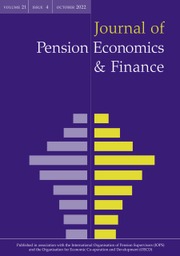Article contents
Differential mortality, aging and social security: delaying the retirement age when educational spillovers matter
Published online by Cambridge University Press: 11 January 2016
Abstract
To lower the forecasted increase in the social security burden linked to population aging, delaying the legal age of retirement has been privileged throughout industrialized countries. Compared with a uniform delay, some argue that those who have entered precociously the labor market should be allowed to retire earlier. They assert that such a ‘long career’ exception is all the more justified that those unskilled workers live also less long due to heavier and potentially health-damaging jobs. In this paper, we then study macroeconomic and distributional consequences of global gain in life expectancy, with or without the postponement of the legal age of retirement and with or without a ‘long career’ exception. By considering a framework where individuals decide to acquire skills depending on economic incentives and differential mortality, we focus particularly on spillover effects possibly generated by education. We show in particular that introducing a ‘long career’ exception cannot be to the advantage of future unskilled workers unless education yields no spillover effects.
- Type
- Articles
- Information
- Journal of Pension Economics & Finance , Volume 16 , Special Issue 3: Financial Knowledge and Key Retirement Outcomes , July 2017 , pp. 395 - 418
- Copyright
- Copyright © Cambridge University Press 2016
References
- 7
- Cited by


